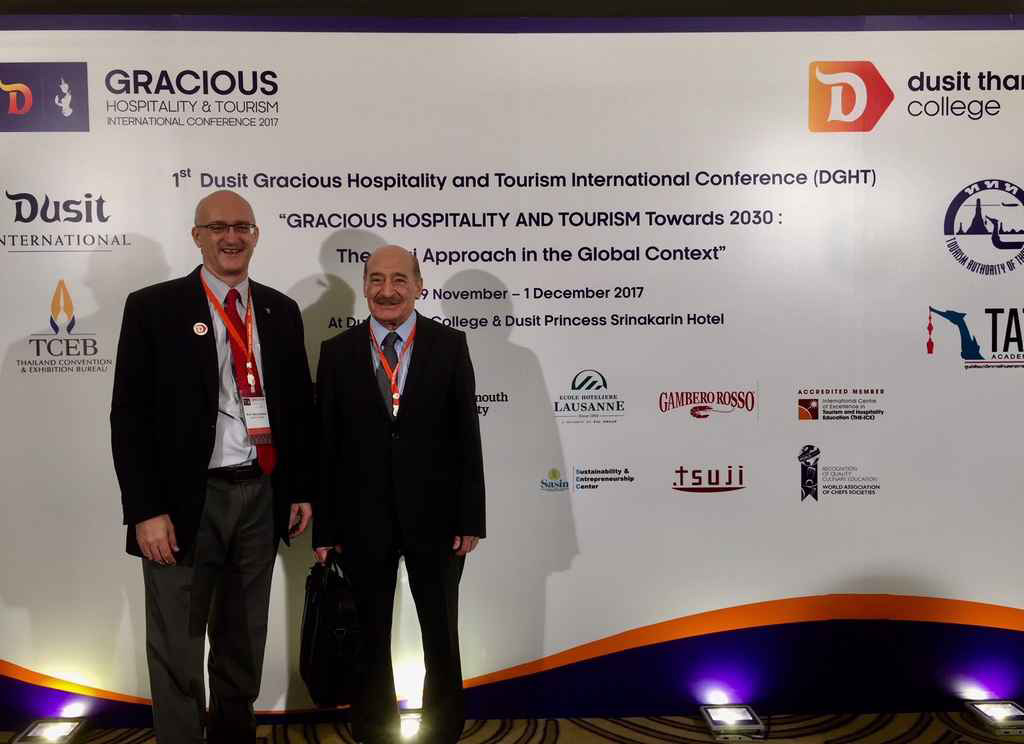“Gracious Hospitality and Tourism: Towards 2030” Taylor’s University Professor Shares His Views on the Future of Hospitality and Tourism
The 1st “Gracious Hospitality and Tourism: Towards 2030” conference was hosted at Dusit Thani College in Thailand, where Prof Hobson gave his views on the future of hospitality and tourism.

(L-R) Prof Perry Hobson (PVC-GE), Emeritus Prof Jafar Jafari Founding Editor Annals of Tourism
The growth of tourism offers immense opportunities for economic growth and employment. However, this rapid expansion is putting pressure on infrastructure and destinations amid calls to boost spending, and better manage tourism flows to ensure long-term sustainability. “ Gracious Hospitality and Tourism: Towards 2030 ” was chosen as the theme of the conference organised by Dusit Thani College (DTC) in Bangkok (Thailand). As Dr. Sarote Phornprapha, President of Dusit Thani College noted “Balancing the needs of the host population and the needs of visitors will be critical for the success of the future”, he went onto add that, “Asian Hospitality and Tourism is often seen as offering superior experiences to visitors and guests. Within Thailand, and the Dusit Thani Hotels and College context, Gracious Hospitality and Tourism is emblematic of the experience co-creation”.
Over 3-days sub-themes within the conference focused on topics such as wellness and well-being, the tourist experience, competitiveness and innovation - and also included sessions that looked to try and identify the “Thai Approach to Gracious Hospitality”. The Chair of the closing Plenary Session of the conference was Professor Perry Hobson, the PVC for Global Engagement at Taylor’s University. The other panelists included Dr. Mario Hardy, CEO Pacific Asia Travel Association (PATA, Thailand); Mr. Thanabordee Vajarasthira, Managing Director ITC (Thailand); Mr. Jackson Pek, Vice President Amadeus online systems, (Thailand); and Professor Dimitrios Buhalis, Head of Department - Tourism and Hospitality, Bournemouth University (UK). This panel focused heavily on how on-line booking and open-access of information has already radically changed tourism, and that the arrival of artificial intelligence and virtual experiences along with the connectivity through the Industrial Revolution 4.0 will change this again.
The implications for how humans and machines will work together to create and deliver the tourism experiences of the future is going to bring considerable change. Dr Mario Hardy, looked at the potential for growth in the Asia-Pacific region, and identified that the rapid uptake in new technology would re-shape the industry and employment. Prof Buhalis pointed out that “there is still too much ‘legacy thinking”, adding that “we are on the cusp of some radical changes which many in the industry do not yet seem to have full grasped”. Mr Jackson Pek offered a number of insights as to how Amadeus (which started out as on-line airline reservation system) was radically re-altering its business to offer virtual experiences, and also to incorporate artificial intelligence. Finally, Prof Hobson also gave his views on how technology and various innovations would shape the future. His comments were based on the work he has been doing as a Visiting Professor at IMC (Austria), where he has regularly delivered a series of lectures focusing on ‘Innovation in Hospitality and Tourism’ over many years. Dusit Thani College (DTC) is Thailand’s leading private hotel school, and both DTC and Taylor’s University are accredited members of the International Centre of Excellence in Hospitality and Tourism Education (THE-ICE) - (Global Matters 2018)